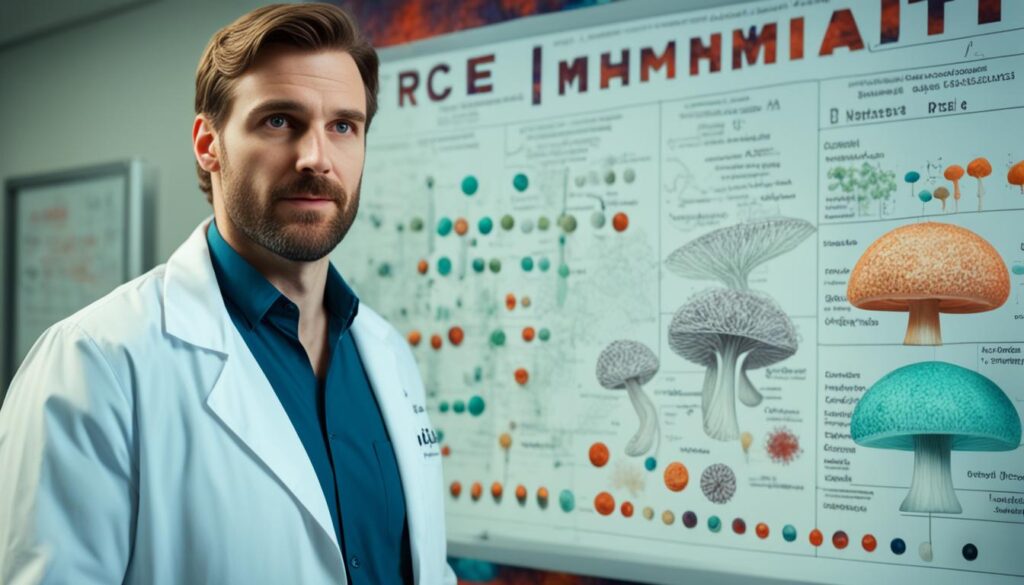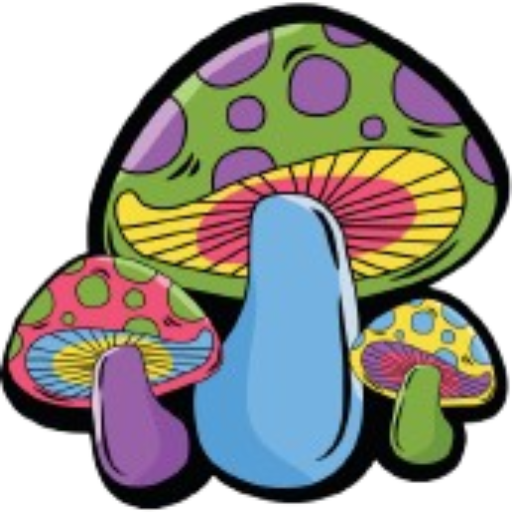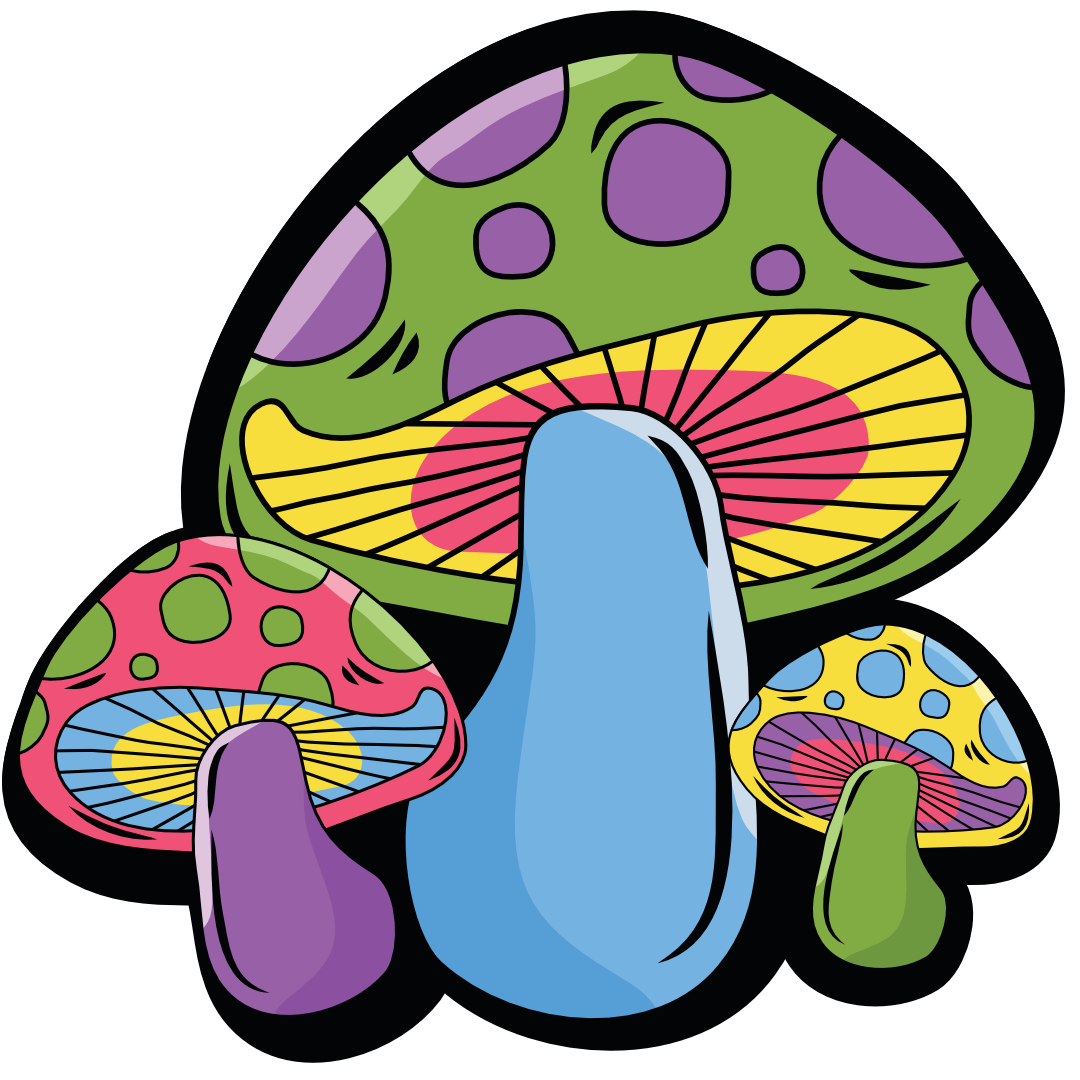Canada is leading the way in psychedelic research, especially with psilocybin, the main part of magic mushrooms1. Researchers are looking into how psilocybin can help with PTSD, substance use disorders, and mental health issues. This article will cover the new studies in Canada, the exciting work being done, and the hurdles in this new medicine area.
Recently, there’s been a big interest in psychedelics in Canada. Scientists and doctors are looking into how these substances can help with mental health problems2. They’re tackling issues like the opioid crisis in British Columbia and finding new ways to treat depression, anxiety, and end-of-life care.
The Resurgence of Psychedelic Research in Canada
Canada has a long history of studying psychedelics, starting in the 1950s and 1960s. Researchers at the Weyburn Mental Hospital in Saskatchewan used LSD, mescaline, and peyote to help treat mental health issues3. But, this work stopped in the late 1960s when psychedelics were seen as dangerous drugs with no medical use. Now, there’s a new interest in their healing potential, with Canadian scientists leading the way.
A Brief History of Psychedelic Research
Back then, scientists like Humphry Osmond and Abram Hoffer were key in Canada’s psychedelic research3. They worked in the 1950s and 1960s to understand how these substances could help with mental health. But, the view changed, and psychedelics were made illegal, stopping this research for many years.
The Renewed Interest in Psychedelics
Now, studies show that psychedelics, especially psilocybin, can be helpful when used with therapy345. Canadian scientists are leading the way, doing trials to see how these compounds can help with mental health issues. They’re looking at things like alcohol addiction, depression that doesn’t get better with other treatments, and helping cancer patients with their mental health3.
With medical marijuana legal in Canada and its economic benefits, there’s hope for psychedelics too4. This could lead to more research and new ways to use these substances to help people.
“When psychedelics are combined with psychotherapy, participants can experience profound positive shifts for various mental illnesses.”5
The future of psychedelic medicine in Canada looks bright. Researchers and healthcare workers are setting up the rules and standards for using these compounds safely and effectively in treatment45.
Psilocybin Research Canada at the Forefront
Canadian researchers, especially those at the British Columbia Centre on Substance Use (BCCSU), are leading in psilocybin research and psychedelic studies6. The BCCSU aims to find new ways to treat addiction with evidence-based methods. They are studying psychedelics like MDMA and psilocybin7. This research is crucial for tackling issues like the opioid crisis.
At the BCCSU, researchers are pushing for psilocybin legalization. They believe psychedelic medicine canada can change how we treat mental health7. Their work on end-of-life psilocybin therapy and depression treatment psilocybin is getting a lot of attention6.
The BCCSU’s work is part of a growing interest in psychedelic studies in Canada7. Researchers and healthcare workers see great potential in these substances for mental health7. With ongoing research and more awareness, psilocybin research canada is set to be key in the future of psychedelic medicine and mental health treatment6.
The MDMA Clinical Trial for PTSD Treatment
Psychiatrists in Vancouver are starting a phase III clinical trial on MDMA, also known as ecstasy, for PTSD treatment8. This study is a double-blind, placebo-controlled one, run by the BCCSU. It’s part of a big effort in North America and Israel to see if MDMA can help9.
The Significance of the Trial
Earlier phase II trials looked promising, with 68% of patients saying they didn’t have PTSD symptoms a year later8. MAPS Canada supports various studies, including an ongoing Phase 3 trial and a pending Phase 1 trial9. Psilocybin and MDMA are the top psychedelics used in therapy10.
The Treatment Process
The treatment has three eight-hour sessions with MDMA, spread over three months. There are also nine 90-minute sessions without the drug8. Health professionals need special permission from Health Canada to work with these drugs10.
“In the Phase 3 clinical trials by Multidisciplinary Association for Psychedelic Studies (MAPS) in the U.S., about 71% of participants who took MDMA no longer qualified for a PTSD diagnosis after three dosing sessions along with therapy.”
Health Canada is watching the FDA’s review of MDMA closely. They haven’t applied for MDMA to be approved yet8. They review requests for these drugs one by one10.
Exploring the Therapeutic Potential of Psilocybin
Psilocybin, found in magic mushrooms, is being closely studied for its healing powers. Researchers in Canada are leading the way in this field. They’re looking into how psilocybin can help with mental health issues.
Psilocybin for Substance Use Disorders
The BC Centre on Substance Use is starting a study on psilocybin for substance use disorders. Studies show psilocybin can change behavior and improve mental health for a long time. This makes it a possible treatment for addiction11.
The BCCSU is building on evidence that psychedelics can help people overcome addictions. This includes issues with alcohol and nicotine11.
In Canada, psilocybin is being studied for many mental health issues. You can get it through Health Canada’s Special Access Program or a special exemption for research or medical use11. Early results are promising for treating depression, anxiety, mood issues, and stress11.

Psilocybin is showing great promise in mental health and addiction treatment. Canadian researchers are leading the way in this new area. They offer hope for new ways to deal with depression and end-of-life care.
The Funding Challenges of Psychedelic Research
Even though psilocybin research canada and psychedelic studies show promising results, getting money for these studies is hard12. The market for psychedelic drugs could hit over $12 billion by 203012. But, not much government money goes to this important psychedelic medicine canada and mental health psilocybin research12.
Corporations are now helping fund clinical trials, like the MDMA trial for PTSD, which took six years and $200,000 to start12. But, what gets researched often depends on what can make money, and companies might pick substances they own patents for12. This might mean depression treatment psilocybin and end-of-life psilocybin therapy get left behind for more profitable studies12.
Also, studies funded by companies might only pick certain people to join, which could limit how useful the results are in real life12. There are worries that some studies only show the good parts and hide the bad ones12. This could make people think psychedelic medicine canada is safer and more effective than it really is, affecting decisions on psilocybin legalization12.
The British Columbia Centre on Substance Use (BCCSU) is looking to the philanthropic community for help, thanks to big donations13. This shows how important it is to use different ways to fund research14. We need clear info on who’s funding studies, careful media coverage, strict research rules, teaching the public, and funding for real-world studies to keep psychedelic research canada safe and honest12.
To move forward with psilocybin research canada and psychedelic studies, we need to tackle funding issues and keep research honest and safe. With new ways to fund and being open about funding, we can unlock the full potential of therapeutic psilocybin and other psychedelics. This could lead to big changes in mental health and well-being.
Understanding the Brain Biology of Psychedelics
Psychedelics like psilocybin and LSD have caught the eye of scientists in recent years. They want to know how these substances help with mental health. Researchers are working hard to understand how psychedelics affect the brain15.
Scientists think psychedelics break down barriers in the brain. This lets different parts of the brain talk to each other better. This could explain why people feel a deep connection and why they might get better from things like depression and anxiety15.
At Queen’s University in Canada, researchers are leading the way in this field. They have a committee on psychedelic science. Recently, they added Fernanda De Felice, Erika Dyck, and Tracy J. Trothen to their team15.
“The committee members serve two-year terms, with six continuing members who started their terms on April 1, 2022. Queen’s University will continue to make future appointments to the committee in spring 2024, aligning with a commitment to supporting Black, Indigenous communities.”15
Canada is also seeing growth in psychedelic research. The Psychedelics Research Collaborative is working with the Journal of Military, Veteran and Family Health. They’re looking into how psychedelics help military members and veterans. The ROAR CANADA study is also big, focusing on people with severe mental health issues1516.
As psychedelic medicine grows in Canada, we’re learning more about how psychedelics work in the brain. With more studies and trials, the future of psilocybin research canada and psychedelic studies looks promising1516.
Microdosing: The Future of Psychedelic Research?
Researchers at the University of Toronto are leading the study of microdosing. This involves taking small doses of psychedelics like LSD or psilocybin17. Early findings hint that it could boost cognitive abilities and mood, but we need more research17.
The University of Toronto Centre for Psychedelic Studies
The University of Toronto Centre for Psychedelic Studies (PSRP) was created to delve deeper into this topic18. They aim to run strict, controlled trials to learn about microdosing’s benefits and risks18. This research could change how we see psychedelic medicine in the future.
The PSRP is starting the world’s first long-term study on microdosing18. They’ve already published a study on its effects18. Now, they’re building a network with top universities in Canada and the US18.
They’re talking to groups like YCombinator and MaRS innovation for support18. They’re also working on getting Health Canada’s okay for their research, including the first university study on psychedelics in Canada18.
Thanks to big donations, the PSRP is ready to lead in psychedelic medicine research18. They plan to raise more funds to keep pushing the boundaries of mental health care18.
“The University of Toronto Centre for Psychedelic Studies is at the forefront of investigating the emerging phenomenon of microdosing, with the goal of conducting rigorous, placebo-controlled trials to determine the potential benefits and drawbacks of this practice.”
Psilocybin Research Canada: Pushing Boundaries
Canada is at the forefront of psilocybin research, exploring new frontiers. Researchers are looking into MDMA for PTSD and psilocybin for substance use disorders19. The British Columbia Centre on Substance Use (BCCSU) is also studying its effects on mental health issues like depression and anxiety19.
This work is based on evidence that psilocybin can change the brain and how people see the world20. When used in a controlled setting, it could lead to deep, lasting changes20.
More Canadians are trying microdosing to feel better without the full trip20. But, psilocybin is still illegal in Canada, even for small amounts20.
Advocates are fighting to change the laws to help more people with mental health issues21. With the pandemic and inflation, the need for psilocybin and psychedelics as healing tools is clear20.

Microdosing might be mostly a placebo effect, but bigger doses show promise for depression and addiction20. Canada is leading the way in understanding psilocybin’s healing potential19.
“We’re seeing a significant increase in the psilocybin industry and cases involving microdosing. But psilocybin remains illegal in Canada, including possession and sale, even in small amounts for microdosing purposes.”
– Paul Lewin, a lawyer
Overcoming Obstacles in Psychedelic Research
Psychedelic research in Canada is making progress but faces big challenges. The fact that many psychedelics are illegal makes it hard to get permission and funding22. Back in the 1970s, psychedelics were made illegal, which stopped most federal funding for research22.
Regulatory Hurdles
Researchers have to go through a lot of red tape to start their studies. This slows down their work22. In the US, the FDA is checking on MDMA and psilocybin for mental health issues. In Canada, psilocybin is used for people with serious illnesses22. Getting past these rules is key to using psychedelics in regular mental health care.
Even with the hurdles, scientists are keen to study psychedelics’ benefits23. Psilocybin has helped reduce depression and anxiety in cancer patients. It also helped alcohol users drink less23. Researchers are working hard to make psychedelic medicine a reality.
“The issuance of questionable patents for psychedelics by the US PTO has sparked debates concerning novelty and non-obviousness.”22
The medical world is pushing forward with psychedelic research, despite legal and regulatory hurdles. By overcoming these issues, scientists can open new doors in treating mental health. This could greatly help people with serious conditions.
The Role of Psychedelics in Mental Health Treatment
In Canada, researchers are exploring the use of psilocybin research canada in mental health care. They’re looking at how psychedelic studies can help with issues like substance use, PTSD, and depression treatment psilocybin. Psychedelics like psilocybin and MDMA could change how we treat mental health problems.
Potential Applications
Studies show that just one dose of therapeutic psilocybin can help with depression for months or even years24. A study found that 92% of cancer patients felt less depressed after one session with high-dose psilocybin. Six months later, 65% were still feeling better24.
In Canada, about 11.3% of people will experience depression at some point, and over a fifth of these cases don’t respond to treatment24. To tackle this, the FDA is backing studies on using psilocybin legalization for treatment-resistant depression24.
Researchers are also looking at how psychedelics can help with tough mental health issues like PTSD24. These studies could lead to new jobs and training for nurses in psychedelic medicine canada-related therapies24.
There are still big challenges, like rules and funding issues. But Canadian researchers are determined to make psychedelics a key tool against mental illness.
“The media has predicted that psychedelics will be the next big thing, indicating a growing interest in psychedelic medicine and its potential clinical applications.”
Health Canada has approved psilocybin for 25 Canadian clinical trials psilocybin25. The government gave almost $3 million for three new trials on psilocybin-assisted psychotherapy in Canada25. In January 2022, new rules let doctors ask for psilocybin through Health Canada’s Special Access Program (SAP)25.
The SAP allows access to drugs not approved for serious conditions when other treatments don’t work or are not available25. These trials and the SAP have rules to keep patients safe, ensure drug quality, and follow ethical and scientific standards2524.
Conclusion
Canada is becoming a world leader in26273> psilocybin research and psychedelic studies. Scientists and researchers here are exploring the healing power of substances like psilocybin and MDMA. They are leading important studies on these compounds.
They are looking into how MDMA can help treat PTSD and how psilocybin can help with addiction, anxiety, and easing end-of-life distress263>. As more research comes in, psychedelics could become a big part of mental health care. They could offer new hope to many people and change how we treat mental health.
FAQ
What is the current state of psychedelic research in Canada?
What is the history of psychedelic research in Canada?
What are some of the key psychedelic research projects being conducted in Canada?
What are the challenges faced by psychedelic researchers in Canada?
How are Canadian researchers advancing our understanding of the brain biology behind psychedelics?
What is the potential role of psychedelics in mental health treatment?
Source Links
- The Canadian revival of psychedelic drug research — University Affairs
- Psychedelics: A new frontier in addiction medicine – UBC Faculty of Medicine
- Government of Canada invests nearly $3 million to study the potential benefits of psilocybin-assisted psych…
- The state of Psychedelics in Canada in 2023
- UHN at the forefront of psychedelic research
- PowerPoint Presentation
- Health Canada holding up approvals of magic mushrooms for therapeutic use, patients and advocates say | CBC News
- Why more B.C. health-care workers are training to provide MDMA-assisted psychotherapy | CBC News
- Research – MAPS Canada
- Notice to stakeholders: Requests to the Special Access Program (SAP) involving psychedelic-assisted psychotherapy
- Psilocybin: Psychedelics At a Glance
- How corporate involvement in psychedelic research could threaten public safety
- Toronto’s CAMH gets 1st federal grant to study magic mushrooms as treatment for depression | CBC News
- Psychedelics: safely navigating a new frontier
- Psychedelics Research
- Projects – The B.R.A.I.N. Lab
- Rethinking psychedelics: U of T study looks at the practice of microdosing to ease anxiety and sharpen focus
- Research Program Background | Psychedelics Studies Research
- Can psychedelics aid Canada’s mental health crisis? One expert says yes
- Some Canadians are microdosing magic mushrooms for their mental health, but research on benefits is slim | CBC Radio
- Access to psilocybin in Canada – PSYCH
- Psychedelic therapy: a roadmap for wider acceptance and utilization – Nature Medicine
- History repeating: guidelines to address common problems in psychedelic science
- Magic mushrooms and the future of mental health care
- Petition e-4334 – Petitions
- Longitudinal experiences of Canadians receiving compassionate access to psilocybin-assisted psychotherapy – Scientific Reports
- Psychedelic medicine: a re-emerging therapeutic paradigm

